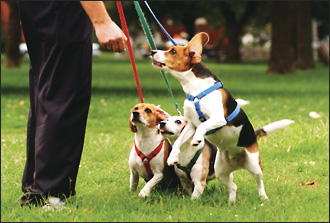Regulations Dog Hill
Neighborhood Residents Lament Proposed Rules for Animal-Friendly Parks

Monday night’s public meeting on proposed regulations for creating dog parks left many Capitol Hill residents dissatisfied and claiming their questions remain unanswered — including whether neighborhood green spaces will pass muster.
“They just weren’t thinking when they wrote these regulations,” said Bill Schultheiss, an advisory neighborhood commissioner who lives in the Northeast section of Capitol Hill.
A meeting last week also proved fruitless, he said. “It was a disgraceful performance for a city agency. They couldn’t answer questions. They hadn’t done any analysis. … I felt uncomfortable for these people.” [IMGCAP(1)]
As the owner of a 6-year-old mutt named Veda and a member of the group Hill Hounds, Schultheiss has followed the issue since the D.C. City Council passed legislation allowing off-leash dog parks in 2005.
Now, he and other Hill residents are worried the council’s action will mean nothing because the Department of Parks and Recreation, tasked with implementing the legislation, has drafted regulations they say shut out any hope of legitimizing existing parks where dogs run off-leash unchecked. Among the regulations: The dog park must be at least 10,000 square feet, cannot take up more than a quarter of an existing District-owned park and must be located within 50 feet of a “sanitary or combined sewer line” where waste can be disposed.
A controversial rule that required the surrounding five blocks to be rat-free is likely to be removed at the request of the Department of Health, according to Health official Peggy Keller.
Residents are worried because a majority of the proposed regulations are hard to meet in a city, especially on Capitol Hill. Many residents own dogs, Schultheiss said, sometimes as an extra safety measure in neighborhoods where robberies are not uncommon.
Many of those owners pay almost $200 a year to walk their dogs in Congressional Cemetery, a private property where dogs can run off-leash among the tombstones and landscape. But others illegally use green spaces that tend to be small squares surrounded by residences and businesses (Lincoln Park and Stanton Park are two of the most popular). These might be difficult to legalize, as the proposed regulations stipulate that dog parks must be 200 feet away from residences, businesses, school playgrounds and community gardens.
“There wouldn’t be a single piece of land in Shaw that would meet the 200 feet from residences” restriction, complained one resident from the neighborhood, which is located in Northwest.
Although the comment period for the regulations was extended because of complaints, dog owners found out Monday that they might not get a say on whatever changes officials make after the public meetings, the last of which will be today at 7 p.m. at The Riverside Center, located at 5200 Foote St. NE. After that, officials will make their changes, submit the regulations to the city’s attorney general for legal requirements and finalize it all.
At Monday night’s meeting, officials from the Department of Parks and Recreation, the Department of Public Health and the Department of the Environment listened to residents’ concerns.
“People don’t want a dog park next to their house because of the noise,” explained Sharon Dendy, a DPR landscape architect. “We felt that there needed to be some respect for homeowners.”
But residents argued that they should be afforded the same rights as noisy soccer players and children at playgrounds. And when officials said they couldn’t answer some questions — such as whether one loud resident could stop a dog park from being formed — participants appeared exasperated.
“Most of the sticking points tonight are directed to people who aren’t here,” one resident said, receiving applause from the audience.
“It seems like these regulations were written by a lawyer,” said another.
But foremost among the questions was which sites in the city — if any — actually meet the regulations. Dendy said about 35 meet all but the rat provision; however, the parks department was unable to produce the list by Tuesday afternoon.
Furthermore, much of the green space on Capitol Hill is not District-owned, which is the only land that the parks department will designate as dog parks. If residents want dog parks on National Park Service land, they will have to solicit such permits themselves, Dendy said.
But if no parks on Capitol Hill become legal dog parks, a problem will be left unfixed, Schultheiss said.
“People break laws in large number when they feel it’s unreasonable,” he said. “That’s what’s happening now.”





